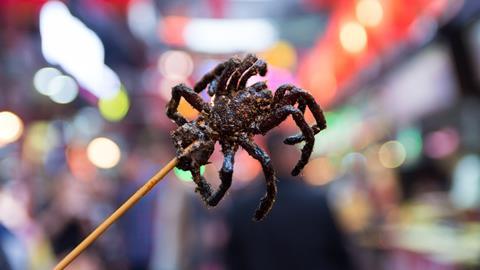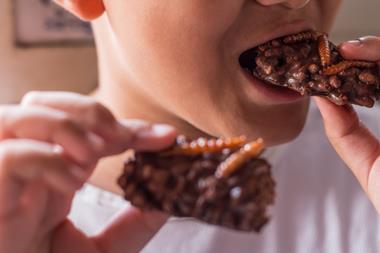Even the Victorians had hipsters. Way back in 1885, Vincent M Holt was parading around in the 19th century equivalent of a Carhartt Holt Jacket, moustache fantastically twizzled, telling anyone who’d listen: “Guys, we’ve got to, like, diversify our diets if we’re gonna save the planet. We absolutely need to start mixing bugs in with our line-caught miso kimchi.”
Ok, so maybe that’s a bit of an exaggeration. But Holt did write an influential one-shilling booklet titled ‘Why Not Eat Insects?’ in which he encourages his countrymen to “delight” in “roasted grubs” – which he personally vouches for.
Unfortunately for Vince, it was a bad idea then and it’s a bad idea now.
Fast-forward over a hundred years and the idea of humans eating insects (it’s called entomophagy, in case you’re wondering) in the west did not really rear its head again until the mid-2010s. A report by the UN’s Food and Agriculture Organisation (FAO) titled ‘Edible Insects: Future Prospects for Food and Feed Security’ led to a degree of mainstream media attention that has slowly bubbled away ever since.
The ‘yuck factor’
The report predicted food production will need to almost double by 2050 to feed an estimated world population of nine billion people. “Alternative solutions to conventional livestock and feed sources urgently need to be found,” the report said, before talking up insects’ nutritional value, describing them as a “highly nutritious and healthy food source with high fat, protein, vitamin, fibre and mineral content”.
No one is doubting that. And, of course, eating insects is standard practice in numerous cultures around the world. I’ve personally tried fried crickets, grubs and even tarantulas. They’re all absolutely fine (apart from the bit where the tarantula’s gloopy abdomen bursts in your mouth).
But it feels like the idea has had more than enough time to catch on over here now, and it just isn’t happening.
As pointed out in one of our many Green Week features, a variety of bug restaurants and insect food brands have come and gone in the past 10 years. Eat at a bug restaurant once, it’s certainly interesting. But unfortunately, those restaurants were always going to struggle with being anything other than a one-visit novelty.
Insect grocery brands are likely to face a similar fate. Eat Grub is doing some exceptionally inventive stuff – chocolate brownie cricket protein bars, cricket jerky, snack packs of roasted crickets in flavours like sweet chilli & lime, smoky BBQ and salt & vinegar. But these also remain largely novelty purchases, used for passing around at a party or as a dare for the kids.
And that’s among the relatively small number of people who can get past the much-cited ‘yuck factor’. A survey of almost 2,000 UK adults by the FSA in 2022 found just 25% would even try insects.
A dog-eat-cricket world
So it’s not looking great. UK-based insect pioneers AgriProtein went into liquidation in 2021; Sainsbury’s started stocking Eat Grub products in 2018 but no longer sells them; and Yum Bug, which had a restaurant as well as a range of cricket-based ingredients, went out of business in May, citing, essentially, lack of demand.
Such unfortunate outcomes have left many pinning their hopes for six-legged suppers on the animal feed sector, with one report by the WWF predicting the use of insect protein in animal feed could replace 20% of the UK’s soya imports by 2025 – a solid win for sustainability.
It seems, on the surface, far more likely than convincing most westerners to munch on mealworms for their dinner. Earlier this year, a Defra-commissioned study cast serious doubt on the sustainability claims surrounding insect protein. It echoed concerns from critics who highlight the energy-intensive nature of insect farming and question whether scaling up insect feed production offers any real improvement over current practices.
Regulatory hurdles since Brexit have also battered those trying to make headway in the nascent category, affecting insects intended for consumption by both humans and farmed livestock.
So the picture looks decidedly grim for the future of insects as food. After all, The Grocer has been asking whether insects will constitute “the new hipster protein” for at least seven years with no significant signs of uptake in the meantime.
It wasn’t hard to predict, but it is a genuine shame. Let’s hope some of the exceptional talent involved (not to mention the time and finances) can be put to use on a sustainability solution that has rather more legs.




















No comments yet